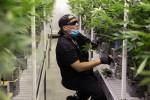Survey war: Study disses Nevada but some question analysis
We get it -- we stink.
For the umpteenth time in the state's four-year-old economic slump, Nevada has landed dead last in a study looking at economic vitality.
But as the Opportunity Index from Massachusetts advocacy group Opportunity Nation makes the rounds in local media, it's worth asking how legit those statistics are. The answer is important: Not only are the numbers potentially irrelevant, but the picture they paint could unfairly harm Nevada's economic recovery, say local economists.
"Reports like this are kind of wrongheaded, and they could do damage to Nevada," said Steve Brown, director of the Center for Business and Economic Research at the University of Nevada, Las Vegas. "They give the wrong impression. In fact, people are finding opportunity here."
To understand where Opportunity Nation's report errs, consider the analysis.
Opportunity Nation, a coalition of businesses, nonprofits, schools and military groups that want to "promote opportunity, social mobility and the American Dream," measured states based on economic indicators, education and civic life. The study gave the Silver State low marks in, well, everything.
On the economy, which includes unemployment, poverty, high-speed Internet access and banks per 1,000 people, Nevada scored four out of 10 against a national average of 5.53 out of 10.
The state's education score, which evaluates preschool enrollment, high school graduation rates, higher education subsidies and bachelor's degree attainment, came in at one out of 10, compared with 5.47 nationwide.
On community health and civic life, which gauges volunteering rates, violent crime, the share of adults who belong to organized groups, the number of doctors and the percentage of ZIP codes with grocery stores, Nevada also earned one out of 10, compared with 5.53 nationally.
In all, the Opportunity Index gave Nevada 21.32 points out of a possible 100. Only one other state -- Mississippi -- even scored in the 20s, at 29.84.
QUESTIONING THE DATA
Opportunity Nation didn't respond to a request for comment.
But local observers say it's just not that bad here. They point to two problems with Opportunity Nation's analysis. First, many of its measures aren't used in traditional indexes of economic health, while other important statistics that appear in reputable studies are missing. Second, the report doesn't account for the shifting nature of opportunity in Nevada. Rather than broadly painting the Silver State as the Land of No Opportunity, it's more accurate to say its economic possibilities have changed.
Take those measures first.
Brown, an economist for the Federal Reserve in Dallas before moving to Las Vegas in 2010, said variables in the Opportunity Index don't show up in most economic research. High-speed Internet access, bank penetration, group membership -- none of those factors are typically included in studies of growth factors. Nor do economists place much emphasis on the percentage of college degrees, because educated workers can easily move.
Plus, relocating businesses are more concerned about property crime than violent crime. And researchers usually consider median household income, where Nevada scored above the national average, a consequence of economic opportunity, not a determinant.
Some areas, such as education funding, can be traditional measures, but in higher education subsidies, the report has Nevada well above average in share of student costs covered by the state.
What's more, the index doesn't include taxes and red tape, which are proven growth influences, Brown said.
Nor is there any discussion of overall business costs, added Brian Gordon, a principal in local research and consulting firm Applied Analysis.
"It's not an econometric study, and I don't really think it has any value beyond drawing attention to the organization that produced it," Brown said. "The takeaway is, Nevada is hurting right now. But calling it 'opportunity' is really a mistake, because there's a lot of opportunity in Nevada to put resources to work that are not being used right now."
THE CHANGING FACE OF OPPORTUNITY
Gordon agreed that opportunity hasn't abandoned Nevada; it merely looks different today. Talk has shifted from work-force availability and housing affordability before the recession to excess capacity and plummeting prices in residential and commercial real estate today. For investors, buying opportunities have never been better here, and for locals, the housing price-to-income ratio has rarely looked so attractive.
That's why capital from California, Canada, China and all points between is flocking to Las Vegas to snap up real estate, Brown noted.
"Since we're seeing money pouring in, it suggests that in some sense the report is maybe irrelevant," he said.
Cheap real estate is also important to relocating businesses and to startups, which Nevada secretary of state numbers show are rising.
Sure, times are tough for tens of thousands of jobless Nevadans, particularly in construction. But the state has pockets of opportunity in many sectors, Gordon said.
Just ask Jason Maier, an attorney who in August opened the law firm Maier Gutierrez & Associates at 2500 W. Sahara Ave.
"It's a good time to open a new business in Las Vegas, because things are a lot less expensive than they used to be," Maier said.
It's also been easy to find qualified employees. The firm didn't even have to advertise for a legal assistant when it hired one six weeks ago. Simple word-of-mouth quickly brought the business a well-qualified worker. Maier Gutierrez expects similar fast hires as it continues to staff up in coming weeks.
"The people are out there, and the opportunities are there, too," Maier said.
Contact reporter Jennifer Robison at jrobison@reviewjournal.com or 702-380-4512.





























